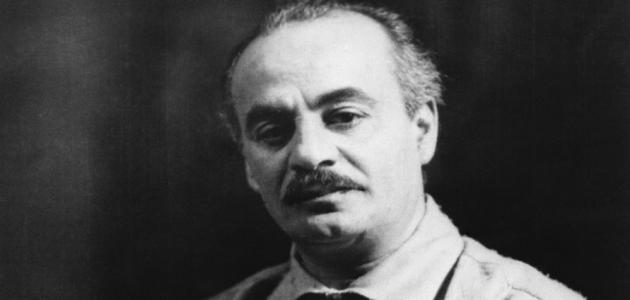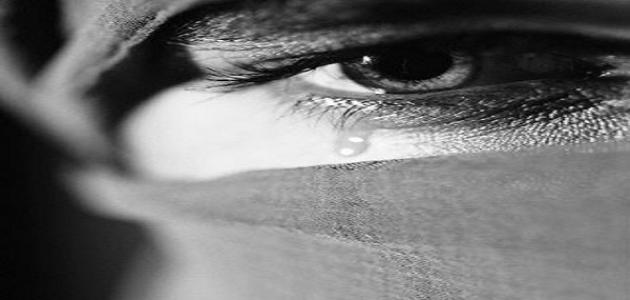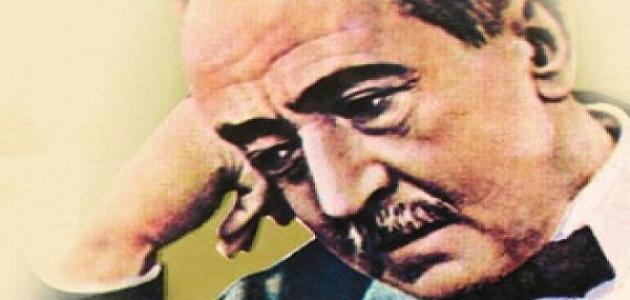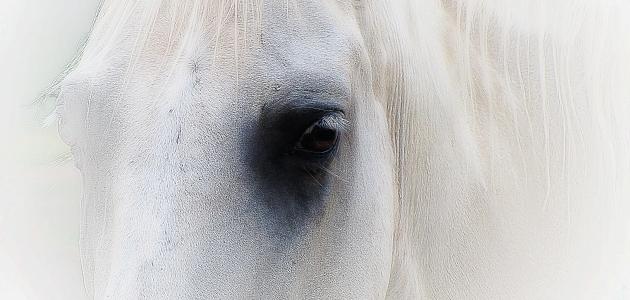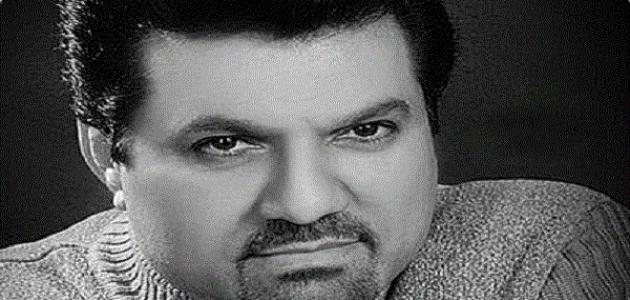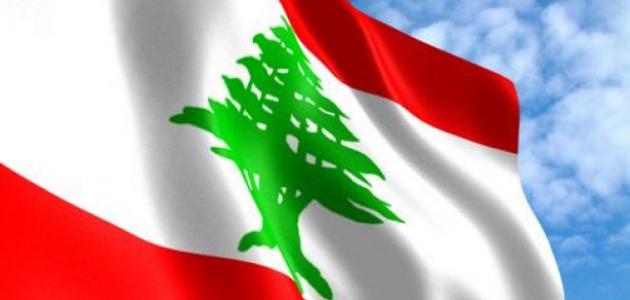Khalil Gibran
Lebanese poet, writer, philosopher and painter, born in 1883, died in 1931 of tuberculosis, studied art in the United States of America and began his artistic and literary career there. He became famous in the Western world after the book The Prophet, which he wrote in 1923. Gibran's poetry works ranked second In sales in the United States of America, the best-selling poet was ranked, after the writer Shakespeare and Lawsie.
His writings are characterized by two aspects: enjoyment of life, and an ideological nature in which he criticizes the style of religious beliefs. Among his most important works in Arabic are processions, broken wings, meadow brides, innovations, and jokes.
Analysis of the poem processions
The procession poem is a long romantic poem, in which Gibran interacted with nature and its details, justifying that nature is the cause of absolute happiness, and a model for the ideal world far from evil and falsehood. Gibran is considered one of the first Arab poets who sang about nature and excelled in describing it.
Gibran named his poem in the name of the processions, in reference to the human masses who have lost their way in choosing the right path that makes them happy, and they thought that the source of their happiness and freedom was in the fake world of materialism and artificial civilization, and they succumbed to false customs and traditions. Gibran called in his poem to return to the world of nature where common sense is. Gibran composed the poem in two different weights, the Majzor Al-Raml and Al-Basit.
The procession poem consists of six stanzas. The first five stanzas, which are similar in structure and composition, refer to a description of reality, and a description of the jungle according to the writer’s personal opinion. As for the sixth stanza, it differs in its construction and composition, in which Gibran expressed his longing for the picturesque nature of Lebanon. Below is a brief analysis of the pieces that Gibran referred to, according to his personal opinion:
Read also:The difference between love and adoration- Good cut: Gibran believes that people are inherent in evil, and that evil is rooted in their human souls even after death, and that they do not offer good unless they are forced to do so, because goodness is not of their nature.
- Gibran also pointed out that time changes the souls of weak people and controls and tamperes with them like machines, and stressed that there must come a day when people will be liberated from the control of this frivolous time. Without thinking or insight into the path, and this is the reason for their destruction and loss, he also called for a return to the world of the jungle; Where absolute freedom, inspiring nature without obstacles and currents affecting humans.
- Debt cut off: Gibran saw that people do not adhere to religion except to achieve personal desires such as appearing in the clothes of piety, or greed for heaven, or fear of fire, or for other reasons that are not clear, and he made it clear that if it were not for the existence of reward and punishment, they would not worship God.
- Gibran described religion as commerce, that is, if people adhere to acts of worship, they win Paradise, and if they leave it, they lose and enter Hell, while this exclusive equation (religion and unbelief) disappears in his opinion in the law of the jungle, which is completely different from the rest of the laws, so he considered the jungle an ideal and environmental model to live in with respect, where everyone accepts Regardless of the groups to which they belong, just as he accepts all birds and animals of different voices and shapes, and this is a sign that Gibran used to criticize religions and religious groups that do not accept each other, indicating that the religious character will end one day, but at the same time he believes in the religion of Christians , and the religion of Islam, and Gibran considered that the sound of the flute that resounds in the forest is the sound of true religion, prayer and eternity.
- Justice broken: Gibran ridiculed and exaggerated the description of the system of justice that man established based on the strength of individuals, and indicated that the justice that man establishes from his point of view is unjust justice at the same time. He is considered a hero, and Gibran exaggerated his description when he said the jinn and the dead cry from the justice of the false man, whom he described as fleeting snow after the sun's rays shine, then he returned to describing the forest, indicating that there is no punishment and reward in the forest, nor interference in the affairs of others, or objection to Their actions, justifying this as contrary to the teachings of religion, then Gibran returned and repeated that the sound of the flute and its hymns is the sound of true eternity.
- Flag broken: Gibran referred to the superiority of knowledge over man, and explained that the beginning of the path of knowledge is known and clear to all, while its end is at the end of human life and destiny. He called on man to learn and live with ambition.
- Just as Gibran equated the educated person who is single with his knowledge to the status of the Prophet, the educated person whose knowledge separates him from the people who consider him a stranger among them, because they still live in the past, and Gibran described the educated person with strength and strength despite the kindness and softness he shows in dealing, then Gibran compared that with the law The jungle in which the duality of knowledge and ignorance disappears, and he likens human sciences to fog that disappears with the brightness of the sun of truth, and he repeated and reiterated that the sound of the flute and singing are the best of immortal sciences.
- Happiness cut off: Gibran believed that happiness is an illusion that cannot be achieved. When a person achieves his goal, he gets bored and then searches for another goal. He likened that to the river running towards the plain. Once the river reaches the plain, the river becomes gloomy and slow, looking for another course.
- Gibran also believed that the true happiness of people is only in ambition and hope in achieving the desired thing, but after obtaining this desired, this illusory happiness disappears, and Gibran saw that the happy person is the one who is preoccupied with achieving his goals, then he returned to the law of the jungle where the equation of demand and boredom disappears Because he considers that the forest has everything, and it is also the ultimate hope for everything, and he reaffirmed that singing is the secret of true and eternal happiness.
- Broken description of the forest and nature: The sixth stanza differed from the rest of the poem in terms of the verbal compositional structure, as well as the weight of the rhyme, as Gibran described the picturesque nature of Lebanon and imagined himself among its mountains and plains, and called on people to leave the life of false urbanization and go to the natural life of the jungle, where staying among the water, the nectar of flowers and the warm rays of the sun , ripe fruits, and enjoying the charming nature, then Gibran acknowledged the weakness of man and his inability to do so because life imposes strict complications on him to achieve his interests.
Parade poem
Here are the main verses from the six stanzas:
Read also:Novels of Ihsan Abdel Quddous- first track:
Good in people is made if Ghebroa
And evil in people does not perish even if they are buried
Most people are machines that move them
Fingers of eternity one day and then break
So do not say this is a scholar of knowledge
And don't say that venerable gentleman
The best of people are herds that he walks with
The voice of the shepherds, and whoever does not walk will perish
- second track:
There is no shepherd in the woods
No, not the herd
Winter walks, however
Spring does not go along with it
People were created slaves
who refuses to submit
So if it blows one day
Walking everyone walked
Give me the flute and sing
Valghana nurtures minds
And the groaning of the flute remains
Who is glorious and humiliated
There is no religion in the forests
No, not the ugly infidelity
If the nightingale sang
He didn't say that's correct
People's religion is coming
Like a shadow and goes
No religion has existed on earth
After Taha and Christ
Give me the flute and sing
So we sang the best prayer
And the groan of the flute remains
Read also:Biography of Bin HishamAfter life is gone
And justice on earth would make the jinn cry if they heard
And the dead would laugh if they looked
Imprisonment and death for the insane if they are young
And glory, pride and enrichment if they grow up
The flower thief is reprehensible and despised
And the thief of the field is called the valiant and dangerous
And the killer of the body is killed by its action
And the killer of the soul that humans do not know about
There is no justice in the woods
No, and there is no punishment
If the willow was thrown
His shadow is on the ground
The cypress does not say this
Heresy against the book
The justice of people is snow
If the sun saw it melted
Give me the flute and sing
So we sing the justice of hearts
And the whine of the flute remains
After the sins are gone
- The third track:
Knowledge in people is the first path
As for the end of it, it is time and destiny
The best knowledge is a dream if you attain it
And you walked among the people of Al-Kari, they mocked
If you see the brother of dreams alone
For his people, he is rejected and despised
He is the Prophet and the cold of tomorrow obscures him
For a nation in yesterday's dress, you will be rewarded
He is the stranger to the world and its inhabitant
He is the immigrant to blame people or excuse
And he is intense, even if he shows a million
And it is far away that people have been condemned or abandoned
There is no science in the forests
No, and there are no ignorant ones in it
If the branches are tilted
You didn't say this Galilee
The knowledge of people is flying
like mist in the fields
If the sun came out
Behind the horizons disappear
Give me the flute and sing
We are rich in the best of sciences
And the groan of the flute remains
After the stars are extinguished
- The fourth stanza:
Happiness in this world is only a ghost
Please, if it becomes a body, people will be fed up with it
Like a river running towards the plain, toiling
Even if he comes to him, he slows down and wears it
People were only happy in their excitement
To the impenetrable, if they became separated by it
If you find him happy, he will leave
About the invincible, so say lessons in his creation
- Fifth tracke:
Not in the woods, please
No, there is no boredom
How does the forest hope for a part?
And it all happened
And what is the pursuit of a forest
Hope is hope
Please live
One of these reasons
Give me the flute and sing
Our singing is fire and light
The whining of the flute is longing
Apathy does not condemn him
- Sixth stanza:
Give me the flute and sing
And forget what I said and said
The pronunciation is in vain
So help me what we did
Have you taken the jungle like me?
A home without palaces
So you followed the streams
Climbed the rocks
Did you take a shower?
And you breathed with light
And drank the dawn wine
In cups of ether
Did you sit the afternoon like me
among the grapevines
And the clusters dangled
Gold chandeliers.
